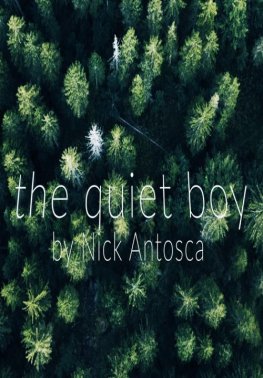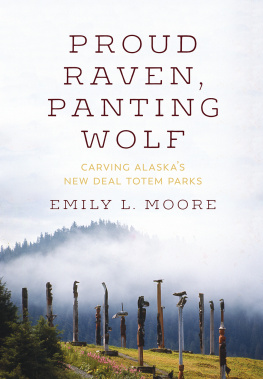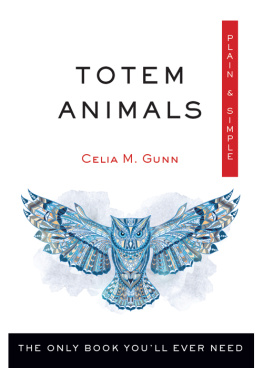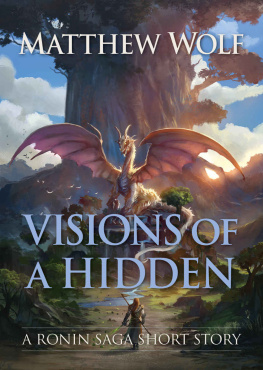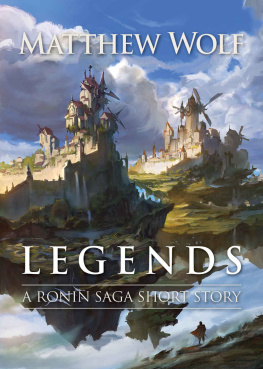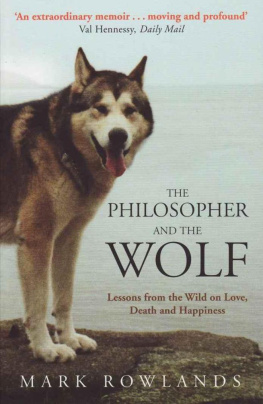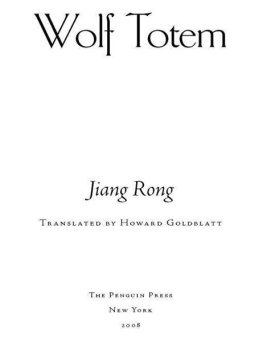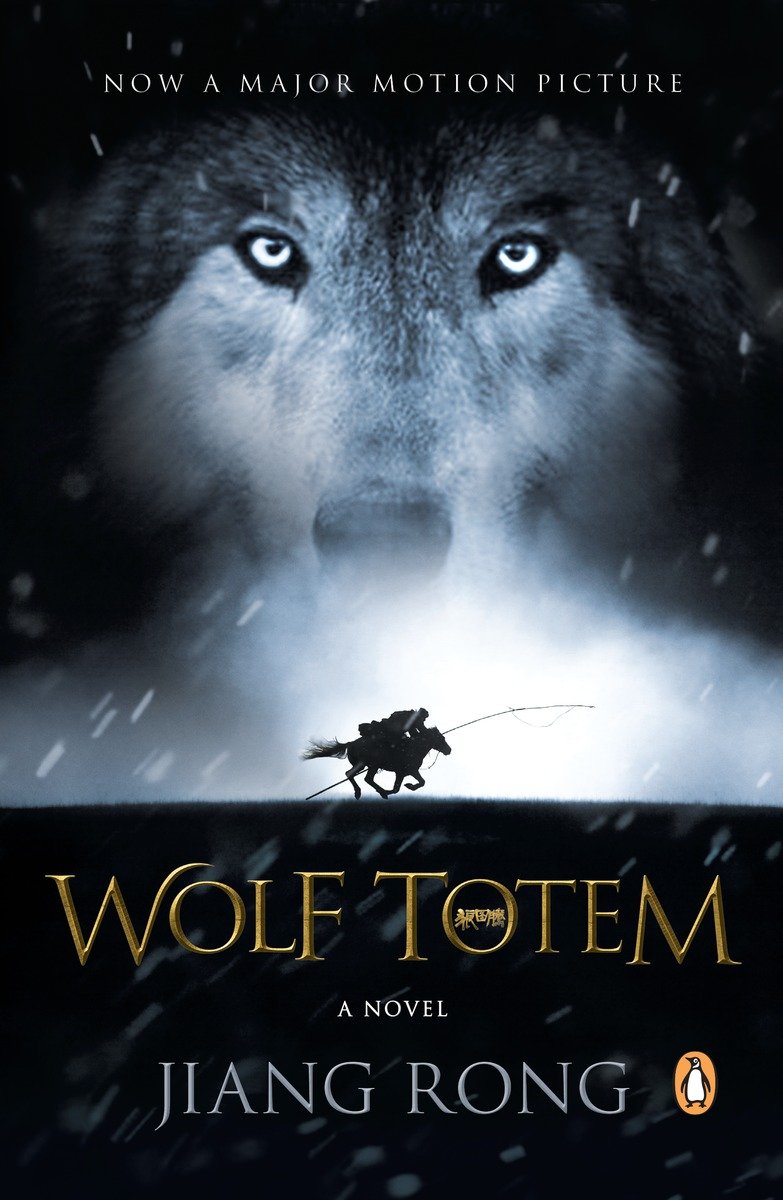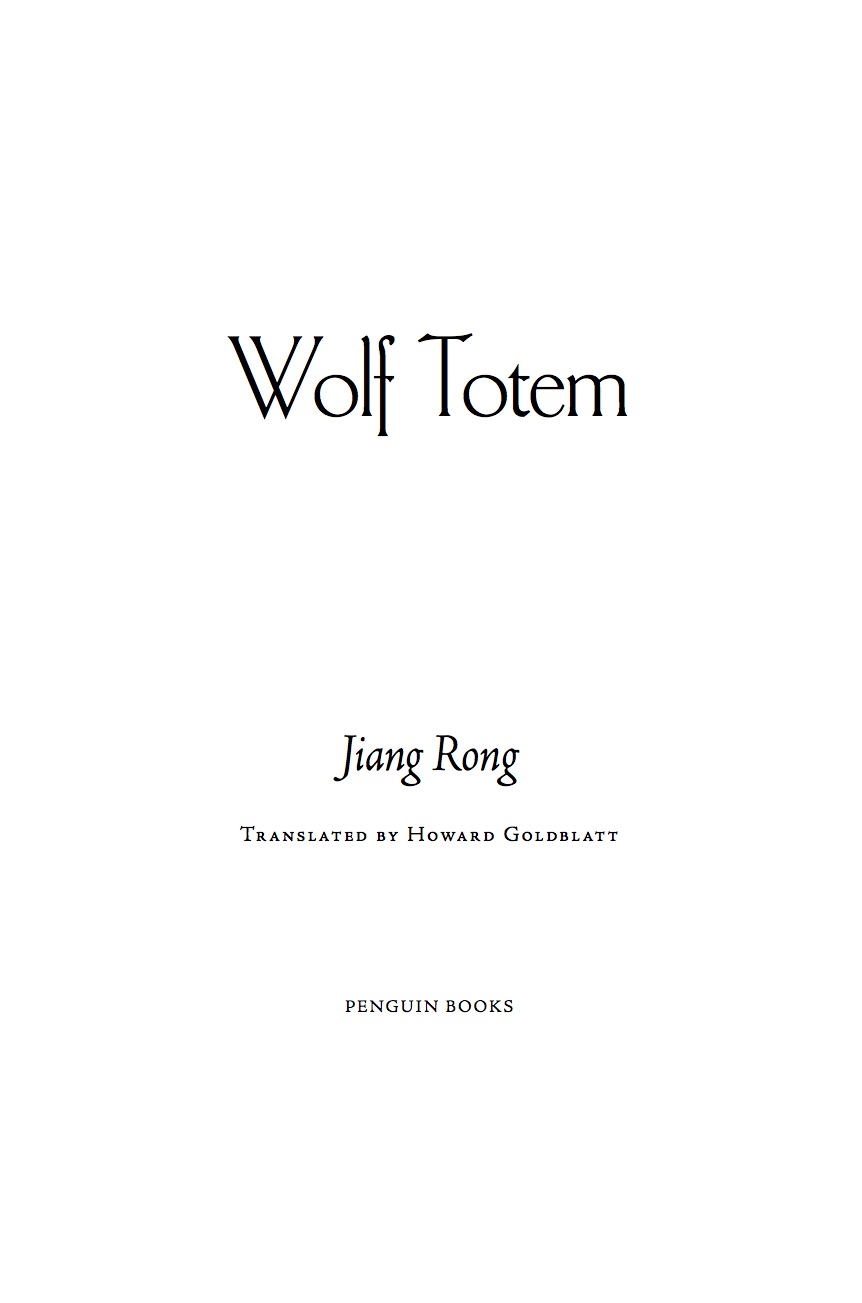PENGUIN BOOKS
WOLF TOTEM
Jiang Rong was born in Jiangsu in 1946. His fathers job saw the family move to Beijing in 1957 , and Jiang entered the Central Academy of Fine Art in 1967 . His education cut short by events in China, the twenty-one-year-old Jiang volunteered to work in Inner Mongolias East Ujimqin Banner in 1967 , where he lived and labored with the native nomads for the next eleven years of his life. He took with him two cases filled with Chinese translations of Western literary classics and spent years immersed in personal studies of Mongolian history, culture, and tradition. A growing fascination for the mythologies surrounding the wolves of the grasslands inspired him to learn all he could about them and he adopted and raised an orphaned wolf pup. In 1978 he returned to Beijing, continuing his education at the Chinese Academy of Social Sciences one year later. Jiang worked as an academic until his retirement in 2006 . Wolf Totem is a fictional account of life in the 1970 s that draws on Jiangs personal experience of the grasslands of Chinas border region.
Howard Goldblatt is the foremost translator of modern and contemporary Chinese literature in the West. He has published English translations of more than thirty novels and story collections by writers from China, Taiwan, and Hong Kong. He has also authored and edited half a dozen books on Chinese literature. He is currently a professor at the University of Notre Dame.
To access Penguin Readers Guides online, visit our Web sites at www.penguin.com or www.vpbookclub.com.
Translators Note
In 1969, a young Chinese intellectual from Beijing answered Chairman Maos call for city dwellers to go up to the mountains and down to the countryside, joining as many as a hundred like-minded youngsters in traveling to one of Chinas most remote, most primitive spots: north-central Inner Mongolia. While most of the fifteen to twenty million young urbanites who were sent out of the cities to be rusticated dreamed constantly of going home and, insofar as possible, shunned close attachments to their rural hosts, Jiang Rong did in fact learn from and befriend the herdsmen with whom he lived and worked. In all, he spent more than a decade as a shepherd on the sparsely populated Olonbulag, a fictional setting in the Ujimchin Banner, a hardscrabble existence in a place where life is unimaginably hard on all its inhabitants, man and beast.
Despite its remote location and hostile environment, Inner Mongolia was not spared the excesses of the disastrous Cultural Revolution (1966-1976), when the nation was on war footing, arrayed against domestic enemies of the state and international enemies of the nation, real and imagined. The four olds (old thought, old culture, old customs, and old practices) were under attack, targeting, in particular, ideologically backward members of superstitious and conservative rural societies. When they werent working to bring down important political, military, and cultural figures, Red Guard factions spent their time tormenting ordinary citizens. Military organizational schemes replaced traditional tribal order, military terminology was in vogue, and military commanders, competent or not, were placed in charge of production activities. In Mongolia, it was an onerous time for people whose lives were centered on respecting the ways and superstitions of their ancestors. They took great pride in the military conquests of those ancestorsthe great Mongol hordes of the twelfth and thirteenth centuriesand were unmoved by the ideologies of Mao and his followers, whose Han ancestors had been no match for the mounted warriors of Genghis Khan. The key to the success of the khans, according to Mongol legend, as the author discovered during his years on the grassland, was the wolf, the only significant land-bound predator that was able to thrive for thousands of years.
Wolves have captured the imagination of peoples everywhere, but seldom have they been venerated to the extent that they are by nomads of the Mongolian grassland. Their paradoxical role in the peoples livesas predator and prey, as defilers of herds (the little lives) and protectors of the grasslands ecology (the big life), and as animals to be feared and at the same time reveredforms both the actual and the metaphorical core of this magnificent novel. Wolves, courageous and ferocious, loyal to the pack, and respectful of their environment, are posited as an antidote for what ails Chinese societya society the quasi-autobiographical protagonist compares to the sheep he tends and which he must protect against the clever, almost supernaturally shrewd wolves he so admires. The symbiotic relationship between the herdsmen and the wolves, participants in a delicate ecological balancing act of keeping at bay the Gobi to the west and the Han Chinese to the south, is threatened by encroachments by both. Wolf Totem, which sold in the millions in Chinain both authorized and pirated editions ushered in heated debates on the Chinese character. It is a work that compellingly blends the passion of a novelist who lived the story he tells and the intelligent ethnological observations of a sympathetic outsider.
In 1979, when Chinese society was trying to rid itself of the effects of the Cultural Revolution, Jiang Rong was admitted into the Chinese Academy of Social Sciences as a graduate student. In 1988, Jiang Rong, who had become a political scientist attached to Beijing University, began writing this novel, obsessed with a story that had stayed with him for nearly twenty years; six years later it was finished and instantly became a runaway bestseller.
In the translation of Wolf Totem, I have been aided by several people. First and foremost, the author and his wife graciously and enthusiastically responded to all my inquiries concerning both textual and cultural matters. Mongolian spellings were supplied by Chigchin, a graduate student in English at the Inner Mongolia University. At Penguin, both the novel and the translator were aided by Jo Lusby in Beijing and Liza Darnton in New York, and, most significantly, by the skillful and imaginative editing of Beena Kamlani. Sandy Dijkstra was instrumental in getting the project started. Finally, Sylvia Lin read and commented on the entire translation, as she always does. To all, my heartfelt thanks.
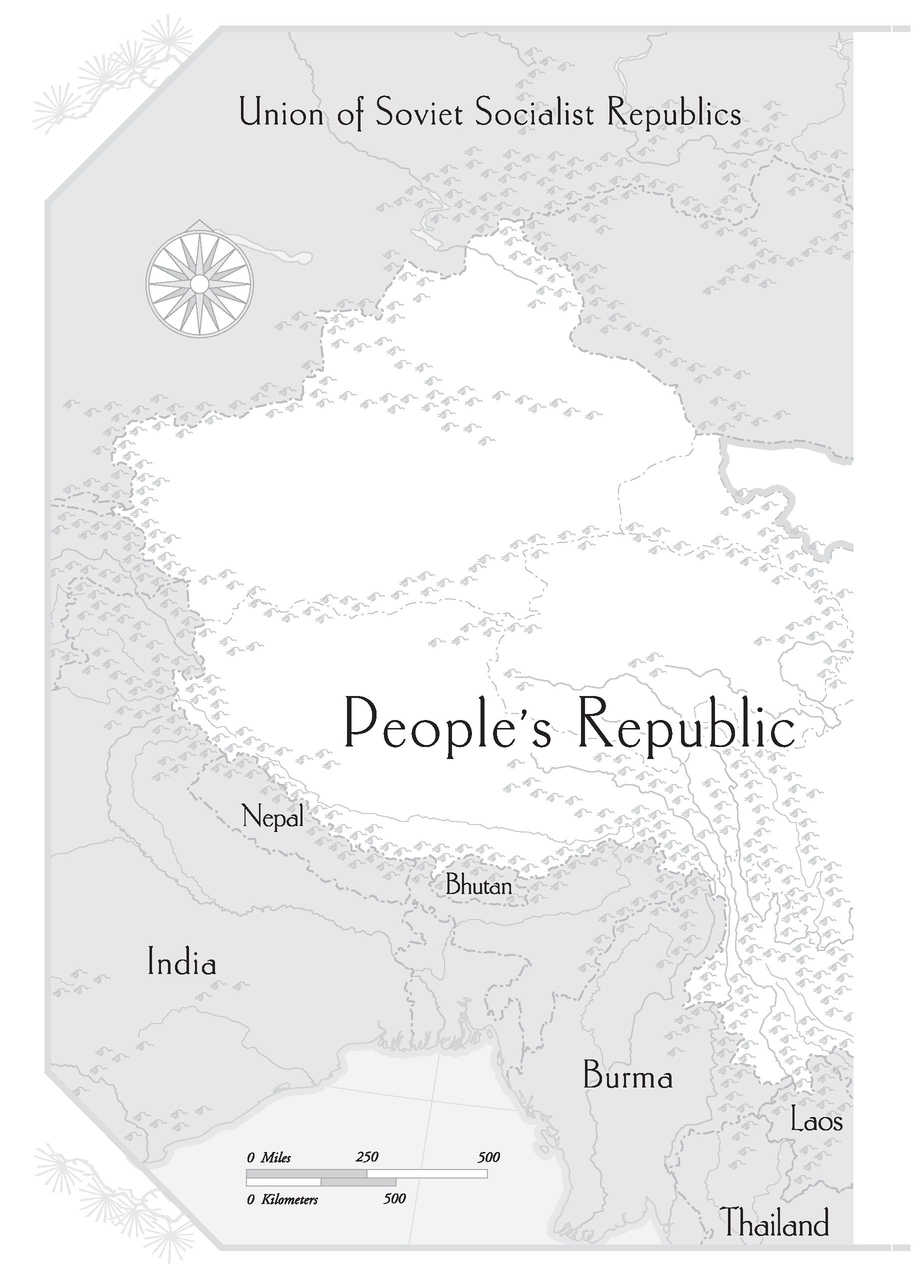
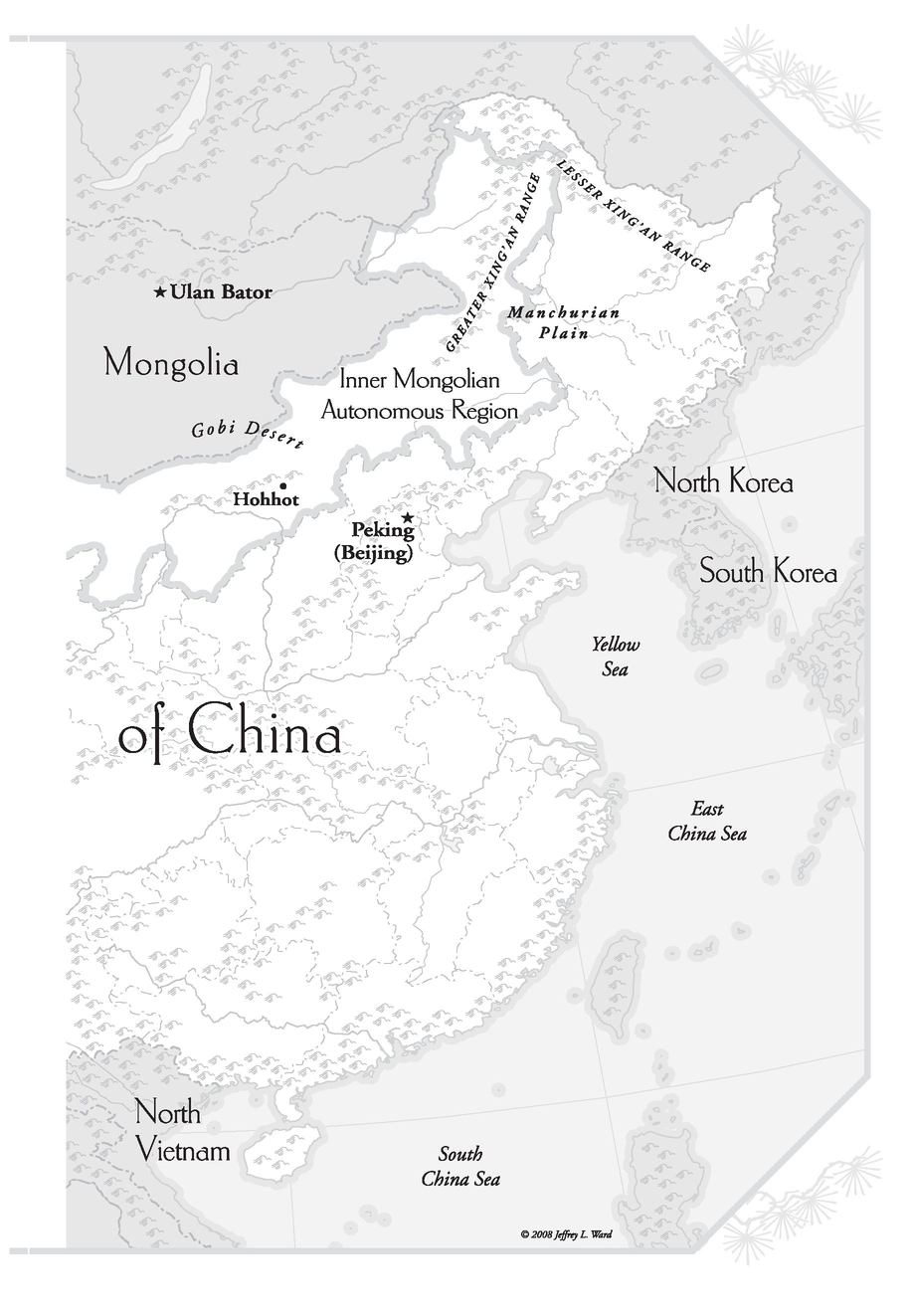
As Chen Zhen looked through the telescope from his hiding place in the snow cave, he saw the steely gaze of a Mongolian grassland wolf. The fine hairs on his body rose up like porcupine quills, virtually pulling his shirt away from his skin. Old Man Bilgee was there beside him. This time Chen did not feel as if his soul had been driven out of his body, but sweat oozed from his pores. He had been on the grassland two years but still had not lost his fear of Mongolian wolves, especially in packs. Now he was face to face with a large pack deep in the mountains, far from camp, his misty breath quivering in the air. Neither he nor Bilgee was armedno rifles, no knives, no lasso poles, not even something as simple as a pair of metal stirrups. All they had were two herding clubs, and if the wolves picked up their scent, their sky burial would come early.


